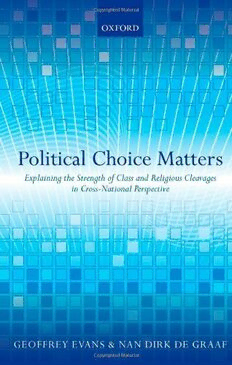Table Of ContentPolitical Choice Matters
This page intentionally left blank
Political Choice
Matters
Explaining the Strength of Class and
Religious Cleavages in Cross-National
Perspective
Edited by
Geoffrey Evans and Nan Dirk De Graaf
1
3
GreatClarendonStreet,Oxford,OX26DP,
UnitedKingdom
OxfordUniversityPressisadepartmentoftheUniversityofOxford.
ItfurtherstheUniversity’sobjectiveofexcellenceinresearch,scholarship,
andeducationbypublishingworldwide.Oxfordisaregisteredtrademarkof
OxfordUniversityPressintheUKandincertainothercountries
#Theseveralcontributors2013
Themoralrightsoftheauthorshavebeenasserted
FirstEditionpublishedin2013
Impression:1
Allrightsreserved.Nopartofthispublicationmaybereproduced,storedin
aretrievalsystem,ortransmitted,inanyformorbyanymeans,withoutthe
priorpermissioninwritingofOxfordUniversityPress,orasexpresslypermitted
bylaw,bylicenceorundertermsagreedwiththeappropriatereprographics
rightsorganization.Enquiriesconcerningreproductionoutsidethescopeofthe
aboveshouldbesenttotheRightsDepartment,OxfordUniversityPress,atthe
addressabove
Youmustnotcirculatethisworkinanyotherform
andyoumustimposethissameconditiononanyacquirer
BritishLibraryCataloguinginPublicationData
Dataavailable
ISBN 978–0–19–966399–6
PrintedinGreatBritainby
MPGBooksGroup,BodminandKing’sLynn
Contents
Preface vii
ListofContributors ix
ListofFigures x
ListofTables xvi
ListofAbbreviations xix
PartI. Models,Measurement,andComparativeAnalysis
1. ExplainingCleavageStrength:TheRoleofPartyPositions 3
GeoffreyEvansandNanDirkDeGraaf
2. MeasuringPartyPositions 27
RyanBakkerandSaraB.Hobolt
3. ClassVotingandLeft-RightPartyPositions:AComparativeStudy
ofFifteenWesternDemocracies,1960–2005 46
GiedoJansen,GeoffreyEvans,andNanDirkDeGraaf
PartII. TheCaseStudies
Anglo-SaxonDemocracies
4. IdeologicalConvergenceandtheDeclineofClassVoting
inBritain 87
GeoffreyEvansandJamesTilley
5. TheUnitedStates:StillthePoliticsofDiversity 114
DavidL.Weakliem
6. AccountingfortheDecliningImpactofClassonthe
VoteinAustralia 137
GaryN.Marks
7. TheClass-PartyRelationshipinCanada,1965–2004 165
RobertAndersen
Contents
MainlandEurope
8. EnduringDivisionsandNewDimensions:Class
VotinginDenmark 185
SaraB.Hobolt
9. ThePoliticalEvolutionofClassandReligion:AnInterpretation
fortheNetherlands,1971–2006 205
NanDirkDeGraaf,GiedoJansen,andArianaNeed
10. PoliticalChangeandCleavageVotinginFrance:Class,
Religion,PoliticalAppeals,andVoterAlignments,1962–2007 243
FlorentGougouandGuillaumeRoux
11. SocialDivisionsandPoliticalChoicesinGermany,1980–2006 277
MartinElff
12. ClassandReligiousVotinginItaly:TheRiseofPolicy
Responsiveness 309
OliverHeathandPaoloBellucci
RecentDemocracies
13. DoSocialDivisionsExplainPoliticalChoices?The
CaseofPoland 337
NataliaLetki
14. SocialClass,Religiosity,andVoteChoiceinSpain,1979–2008 360
LluísOrriols
PartIII. ConcludingObservations
15. TheImportanceofPoliticalChoiceandOtherLessonsLearned 391
GeoffreyEvansandNanDirkDeGraaf
Bibliography 407
Index 437
vi
Preface
SomeyearsagoinameetingatNuffieldCollege,Oxfordtherewasadiscussion
byasagaciousgroupofcommentatorsonwhatthestudyofclassvotingand
classpoliticsshouldaspiretoachieve.Muchofthisdiscussionwasafterwards
publishedinTheEndofClassPolitics?acoupleofyearslater.Theobservations
of those participants and contributors are of considerable interest as they
signalboththeoriginsandthesignificanceofthecurrentvolume.
ForPeterMair,‘yousimplycannotexplaindifferencesinvotingpreferences
fromapurelyclasspointofview—orevenfromapurelysocial-structuralpoint
ofview...youneedtolookatthepoliticalandinstitutionalcontextinwhich
thiscompetitiontakesplace.Allofthesefactorswillhelptoexplainwhysocial
structuretranslatesintopoliticsdifferentlyfromonecountrytoanother.’
From John Goldthorpe there was a similar message, though with a rather
more specific final point: ‘where changes in class voting do occur, these are
not,forthemostpart,ofahighlygeneralizedkind...whenwecometotryto
explainthesechanges,Iwouldguessthatwhatwewillfindisthatnationally
specificfactorsloomverylargeinourexplanations,andespeciallyrelateless
to social structural changes, whether of class, status or whatever, than to
political changes or at all events to changes or differences in the way in
whichpoliticalpartieshaverespondedtosocialstructuralshifts.’
While from Michael Hout, there was a very precise suggestion: ‘We will
nevergetanypurchase...unlesswemeasurepartyscoresontheclassdimen-
sion. In this way we can test ideas about what it is about party appeals that
explainspartyvoting.’
Buthowarewetodothis,inacontemporaryworldwherepartiesdon’tusually
proclaimclassinterestrepresentationastheirgoal?Well,inanotherquotefrom
oneoftheassembledcast,thoughonepublishedsometimeearlierinPolitical
Man (1981: 230), Seymour Martin Lipset observes that: ‘Even though many
partiesrenouncetheprincipleofclassconflictorloyalty,anyanalysisoftheir
appealsandtheirsupportsuggeststhattheydorepresenttheinterestsofdiffer-
entclasses.’Sadly,MartyLipsetisnolongerwithus,buthisinsightsare.Andas
we shall see, modern day party manifestos contain information that reveals
positionsthatdoindeedrelatetotheinterestsandchoicesofsocialclasses.
Amidstthediversityofstylesanddisciplinaryadherenceallofthesescholars
sawtheneedforthesamethings:lessdescriptionofchange;moreanalysisof
Preface
cause;andafocusonpoliticsastheagentofchange.Thisineffectprovidesanice
summationofthehypothesesguidingthiscurrentbook.Althoughclassisnow
onlypartofthepicture:theseideasarenowalsoappliedtoanotherimportant
cleavage: religion. This new book provides evidence of how political choice
mattersforreligiousandnon-religiousvoters,justasitdoesforvotersindifferent
classes.
Those commentators who think that class and religion do not lend them-
selves to an analysis of individual choice need to think again: the idea that
religiousorclasspoliticsreflectsanalmostunthinkingadherencetoorganiza-
tionsrepresentingreligiousprinciplesorclassinterestsisturnedonitshead.
The emphasis is far more consistent with contemporary trends stressing
instrumental accounts of voting behaviour. Class voting, far from being a
‘throwback’toanageoftribalism,issimplytherationalexpressionofindivid-
ual differences in (primarily) economic interests that cluster as a result of
shared characteristics deriving from similar conditions of employment. If
parties do not offer programmes that differ in these respects there is little
reason to expect class differences in party choice. Thus parties can and do
shape class politics by restricting (or accentuating) the responsive voter’s
choice set along relevant ideological dimensions. Similarly for religion: it
may well be a source of identity, of fundamental values, and confessional
parties or parties that take their religious roots seriously have to offer party
programmes that clearly differon moral issuessuchas the battle against the
liberalizationofabortioninordertosignaltheirtrustworthinesstotheircore
vote.Therearenumerousexamplesofhowpartiesshapenationaldiscussions
onmoralissuesbyfocusingtheirprogrammesonconservativeprinciples.But
theyalsobendwithpublicopiniontokeepabreastofthetimesandindoing
so hedge their electoral bets to help ensure they continue to be effective
sources of representation of some version of the religious principles they
uphold. In the competitive market of social and moral positions they too
needtosignalstrategicallywhentheycandosowithoutlossofcredibility.
Sotheanalysisofcleavagesandthesocialbasesofvotingarenotrelicsofa
bygoneintellectualage,northepreserveofsociologistslockedintoalanguage
ofcollectiveidentitiesand‘groupconsciousness’—asthisbookhopestoshow.
For the opportunity to do so we would like to thank the EQUALSOC (Eco-
nomic Change, Quality of Life, and Social Cohesion) network of excellence
funded bytheEuropeanUnion’sSixth FrameworkProgramme.Wealso owe
an unpaid debt to Peter Mair, whose tragic loss in the summer of 2011
deprived us of his further involvement. Peter gave many helpful comments
on this project and at that meeting in Oxford he provided much of the
motivationforundertakingit.Hewillbegreatlymissed.
GeoffreyEvansandNanDirkDeGraaf
NuffieldCollege,November2011
viii
List of Contributors
RobertAndersenisProfessorofSociologyandPoliticalScience,UniversityofToronto.
RyanBakkerisAssistantProfessorinPoliticalScience,UniversityofGeorgia.
PaoloBellucciisProfessorofPoliticalScienceattheUniversityofSienaItaly.
NanDirkDeGraafisOfficialFellowinSociology,NuffieldCollege,Universityof
Oxford.
MartinElffisLecturerinEuropeanandGermanPolitics,UniversityofEssex.
GeoffreyEvansisOfficialFellowinPolitics,NuffieldCollege,andProfessorofthe
SociologyofPolitics,UniversityofOxford.
FlorentGougouisaPhDcandidateinpoliticalscience,SciencePo,Paris.
OliverHeathisSeniorLecturerinPolitics,RoyalHolloway,UniversityofLondon.
SaraB.HoboltisProfessorofEuropeanInstitutions,EuropeanInstitute,London
SchoolofEconomics&PoliticalScience.
GiedoJansenisaPost-docresearcherinpoliticalscience,RadboudUniversityof
Nijmegen,theNetherlands.
NataliaLetkiisAssistantProfessorinSociology,UniversityofWarsaw.
GaryN.MarksisaPrincipalResearchFellowattheAustralianCouncilforEducational
Research,Melbourne,Australia.
ArianaNeedisProfessorofSociologyandPublicGovernance,UniversityofTwente,
theNetherlands.
LluísOrriolsisLecturerinPolitics,UniversityofGerona.
GuillaumeRouxisResearchScientist,InstituteofPoliticalStudies,Grenoble,France.
JamesTilleyisFellowinPolitics,JesusCollege,andUniversityLecturerinQuantitative
SocialScience,UniversityofOxford.
DavidL.WeakliemisProfessorofSociology,UniversityofConnecticut.

